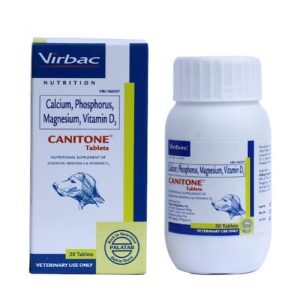Table of Contents
Vitamins are crucial for various physiological processes within a dog’s body. Vitamins are integral for maintaining a healthy immune system, enabling dogs to fight off infections and diseases effectively.
Furthermore, vitamins are essential for proper growth and development, as they contribute to bone formation, tissue repair, and overall cellular health. They also play a role in maintaining healthy skin, coat, and eyesight, contributing to a dog’s external appearance and sensory abilities. Dogs’ diets may not always provide all necessary vitamins in optimal quantities, making supplementation important to bridge nutritional gaps. Moreover, specific vitamins act as antioxidants, helping to combat the damaging effects of free radicals and promoting longevity and overall vitality in dogs.

What Is Canitone (Calcium, Phosphorus, Vitamin D3, Magnesium) 1 mg?
Canitone Tabs stand as a comprehensive and harmonized vitamin-mineral supplement, crucial for enhancing the absorption of calcium in dogs with mineral insufficiencies, as might be advised by a veterinarian. This supplement is especially pertinent for distinct canine conditions, such as pregnant and nursing dogs, as well as for averting milk fever post-whelping.
It can be used for elevating joint support and mobility in both dogs and cats. It amalgamates a blend of chondroitin sulfate, Chitosan, Epigallocatechin gallate, and Selenomethionine. Its purpose is to facilitate various forms of joint ailments in dogs and cats. The supplement promotes bone health and caters to heightened demands during pregnancy and lactation.
Ingredients
Each tablet contains the following constituents:
- Calcium: 700mg
- Phosphorus: 400mg
- Magnesium: 0.5mg
- Vitamin D3: 400 IU
The medicine is produced in 1mg tablets, and the package contains 30, 60, 90, and 120 tabs.
Uses of Canitone (Calcium, Phosphorus, Vitamin D3, Magnesium)
Calcium deficiency in dogs, also known as hypocalcemia, can lead to various symptoms and health issues. Here are some common symptoms of calcium deficiency in dogs:
- Muscle Tremors: Dogs with low calcium levels might exhibit muscle tremors, twitching, or spasms. These involuntary movements can affect different body parts, ranging from mild to severe.
- Weakness: Calcium deficiency can lead to muscle weakness, making it difficult for the dog to move around normally. This weakness can manifest as a reluctance to walk, play, or engage in physical activities.
- Difficulty Standing: Dogs with low calcium levels may struggle to stand up or maintain their balance. This can result in a wobbly or unsteady gait.
- Restlessness and Anxiety: Calcium plays a role in nerve transmission and muscle function. A deficiency can lead to restlessness, nervousness, or anxiety, as the dog’s nervous system is impacted.
- Difficulty Giving Birth: Calcium is particularly crucial for pregnant and lactating dogs. A deficiency during pregnancy can lead to difficulty during labor, increased risk of complications, and even seizures.
- Lack of Appetite: Dogs with calcium deficiency might show a decreased appetite, leading to weight loss.
- Panting and Increased Heart Rate: Calcium is involved in heart muscle contraction and regulation. A deficiency can lead to an increased heart rate, irregular heart rhythms, and excessive panting.
- Seizures: One of the severe consequences of calcium deficiency is seizures. This can occur due to the impact of low calcium levels on nerve and muscle function.
These symptoms can also indicate other health issues, so a proper diagnosis by a veterinarian is crucial. If you suspect your dog might be experiencing calcium deficiency, it’s recommended to seek veterinary attention promptly to determine the underlying cause and receive appropriate treatment.
Dosage Size
Canitone Tabs are suitable for dogs aged six months and above. Small and medium breeds should take one tablet daily, while large breeds should take two tablets daily as their recommended dose.
Important Safety Information for Owners
Before introducing any calcium supplements to your dog’s diet, it’s crucial to consult your veterinarian. They can assess your dog’s needs and health status and determine if supplementation is necessary. Only administer calcium supplements as directed by your veterinarian. Too much calcium can be harmful and lead to issues like mineral imbalances, kidney problems, or even contribute to the formation of bladder stones.
A balanced and appropriate diet is essential. Overreliance on supplements might not address the root cause of any calcium deficiency. Ensure your dog’s diet is nutritionally complete and suitable for their life stage.
Different dog breeds have varying calcium requirements. Larger breeds, for example, might need more calcium during growth periods, while over-supplementation in smaller breeds can lead to problems.
Pregnant and lactating dogs have increased calcium needs, but improper supplementation can lead to eclampsia (milk fever). Veterinary guidance is critical during this phase.
While calcium deficiency symptoms are a concern, excess calcium can also be problematic. Keep an eye out for any adverse reactions such as gastrointestinal upset, lethargy, or changes in behavior.
While calcium is essential, too much or too little can harm your dog’s health. Always work closely with your veterinarian to ensure your dog’s nutritional needs are met appropriately.

Veterinary Prescription
In many cases, you do not need a veterinary prescription to buy over-the-counter calcium supplements for dogs. However, it’s important to clarify that this can vary depending on your location, the specific supplement, and the regulations in your country or region.
While some basic calcium supplements might be available without a prescription, it’s always recommended to consult a veterinarian before introducing any supplements to your dog’s diet. A veterinarian can assess your dog’s needs, perform any necessary tests to determine if supplementation is necessary, and recommend the appropriate dosage and type of supplement.
In cases where a dog has specific health conditions, such as kidney problems or other medical issues, a prescription-based supplement might be recommended. Additionally, certain advanced or specialized calcium supplements might require a prescription due to their composition or intended use.
Always prioritize your dog’s health and well-being. Consulting a veterinarian before deciding about supplements will ensure you make the best choices for your pet’s unique needs.
Interactions
Interactions with calcium supplements can occur when they are taken alongside certain medications or other dietary components. Here are some common interactions to be aware of:
- Iron Supplements: Calcium can inhibit the absorption of iron. If your dog is taking iron supplements, it’s recommended to administer them separately from calcium supplements to ensure proper absorption of both nutrients.
- Certain Antibiotics: Calcium can interfere with the absorption of some antibiotics, such as tetracyclines. Administering these antibiotics close to calcium supplements can reduce their effectiveness. Consult your veterinarian for guidance on timing these medications appropriately.
- Thyroid Medications: Calcium supplements can interfere with the absorption of thyroid medications. Giving thyroid medications separately from calcium supplements is advisable to avoid reduced effectiveness.
- Certain Heart Medications: Some medications used to manage heart conditions, like certain forms of digoxin, can be affected by high calcium levels. Consult your veterinarian if your dog is on heart medications and you’re considering calcium supplementation.
- Vitamin D Overload: While Vitamin D is essential for calcium absorption, excessive Vitamin D intake through supplements can lead to toxicity. Calcium supplements containing high Vitamin D levels should be administered cautiously and under veterinary guidance.
- Phosphate Binders: Some dogs with kidney issues might require phosphate binders to reduce phosphorus levels in their diet. Calcium supplements can contain phosphorus, potentially affecting the effectiveness of these binders. Consult your veterinarian for guidance.
- High-Fiber Diets: High-fiber diets can reduce calcium absorption. If your dog is on a high-fiber diet, consult your veterinarian about the timing of calcium supplementation.
- Other Minerals: Imbalances between calcium and other minerals like magnesium, phosphorus, and potassium can affect overall health. It’s important to consider the overall mineral balance in your dog’s diet.
Always inform your veterinarian about any medications or supplements your dog is taking.
Side Effects
While calcium supplements are generally safe for dogs when used appropriately, excessive or improper use can lead to certain side effects. Here are some potential side effects of giving dogs calcium supplements:
- Digestive Upset: Too much calcium at once can lead to digestive upset, including symptoms like vomiting, diarrhea, and stomach discomfort.
- Mineral Imbalance: Excessive calcium intake without appropriate balance with other minerals like phosphorus can lead to mineral imbalances that affect overall health.
- Kidney Issues: High calcium levels can contribute to the formation of kidney stones or exacerbate existing kidney problems.
- Urinary Issues: An imbalanced calcium-to-phosphorus ratio can affect urinary health and potentially lead to issues like bladder stones.
- Calcium Deposits: Over time, excessive calcium can form calcium deposits in various tissues, including the kidneys and blood vessels.
- Reduced Absorption of Other Nutrients: Excessive calcium can interfere with absorbing other vital nutrients, such as iron and zinc.
- Joint and Bone Issues: While calcium is necessary for bone health, excessive supplementation can lead to abnormal bone growth and development, potentially causing joint and skeletal issues.
- Hypercalcemia: This condition is characterized by excessively high calcium levels in the blood. It can lead to symptoms like muscle weakness, lethargy, vomiting, constipation, increased thirst and urination, and even seizures in severe cases.
- Interference with Medications: Calcium supplements can interfere with the absorption and effectiveness of certain medications, as mentioned in a previous response.
If you suspect your dog is experiencing side effects from calcium supplements, consult your veterinarian immediately for proper guidance.
Overdose
A calcium overdose occurs when excessive amounts of calcium are in a dog’s bloodstream. This can have serious health consequences and should be addressed promptly. Here’s what you need to know about calcium overdose in dogs:
Causes of Calcium Overdose
- Excessive calcium supplementation.
- Ingestion of human calcium supplements or medications.
- Consuming bones, especially those high in calcium, such as large amounts of dairy or bone meal.
- Underlying medical conditions like hyperparathyroidism or certain cancers.
Symptoms of Calcium Overdose
- increased thirst and urination;
- loss of appetite;
- vomiting;
- constipation;
- lethargy and weakness;
- restlessness and agitation;
- muscle tremors or spasms;
- abdominal pain;
- dehydration;
- increased heart rate;
- seizures (in severe cases).
Treatment of Calcium Overdose: If you suspect your dog has ingested an excessive amount of calcium or is exhibiting symptoms of hypercalcemia, seek immediate veterinary care. The veterinarian will likely perform blood tests to measure calcium levels and assess your dog’s health.
Treatment
- Fluid therapy to help flush excess calcium from the system.
- Medications to reduce calcium absorption or promote its elimination.
- Addressing the underlying cause, such as discontinuing excessive supplementation or adjusting the dog’s diet.
- Monitoring and supportive care to manage symptoms.
Prevention
- Always consult a veterinarian before giving any supplements to your dog.
- Choose high-quality dog food that meets your dog’s nutritional needs.
- Avoid giving human calcium supplements or medications without veterinary approval.
- Be cautious with bones and treats containing high levels of calcium.
Remember that even though calcium is essential for dogs, an excessive amount can lead to serious health issues. Monitoring your dog’s diet and health under the guidance of a veterinarian is the best way to ensure their nutritional needs are met safely.
Storage
Proper storage of calcium supplements is essential to maintain their effectiveness and safety. Store them in a cool, dry place, away from direct sunlight, heat, and moisture. Exposure to high temperatures or humidity can lead to deterioration of the supplements. If the calcium supplements come in a resealable container, seal the container tightly after each use to prevent air and moisture from getting in.
Keep the supplements out of reach of pets and children to prevent accidental ingestion. Some supplements might appeal to pets, so storing them securely is essential.
Do not store calcium supplements in areas where temperatures fluctuate dramatically, such as near radiators, stoves, or windows. Extreme heat or cold can affect the integrity of the supplements.
Follow any specific storage instructions provided by the manufacturer on the supplement’s packaging. Check the expiry date on the supplement packaging. Expired supplements may not provide the intended benefits and could be harmful.
Store supplements separately from medications, cleaning products, and other substances to avoid confusion and potential accidental consumption.

































